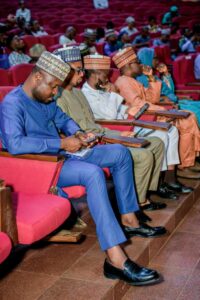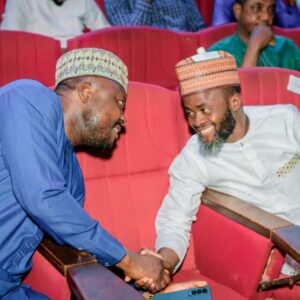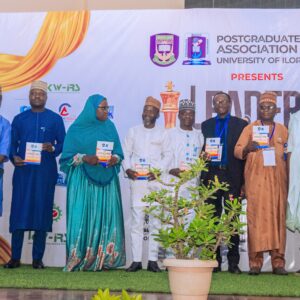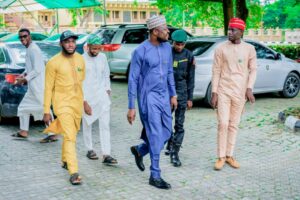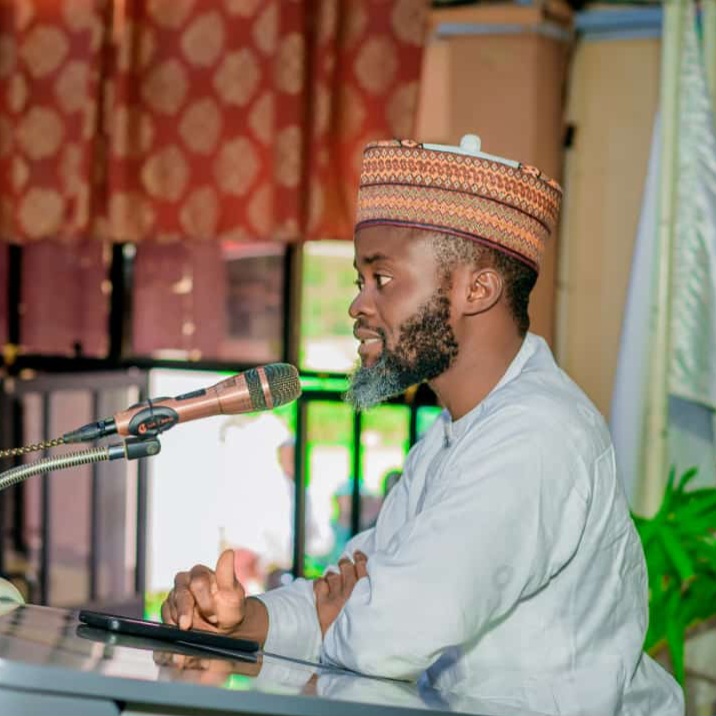In a thought-provoking keynote address at the Leadership Summit of the Postgraduate Students’ Association (POGSASS), University of Ilorin, the Chief Press Secretary to Kwara State Governor Mallam Rafiu Ajakaye emphasized the need for modern leaders to embody essential qualities such as education, empathy, courage, and character to effectively navigate the complexities of the 21st century.
The address highlighted the transformative impact of technological advancements, new media, and demographic shifts on leadership, stressing the importance of leaders being digitally literate and understanding the ethos of the digital age.
Ajakaye also emphasized the role of empathy, courage, and character in leadership, citing the need for leaders to be able to understand and resonate with the needs and aspirations of their people, make tough decisions, and act with integrity and honesty.
The address concluded by urging leaders to commit to being capable, morally courageous, compassionate, strategic, and ethical, and to work towards building a world that is dynamic, just, equitable, and prosperous for all.
The event was attended by postgraduate students of the University, the Deputy Vice-Chancellor of the University, Chief of Staff to the Minister of State for Youth Development, Mohammed Funsho Abdullahi, academics, and professionals, and sparked a lively discussion on the challenges and opportunities of leadership in a dynamic world.
Read full speech below:
Empowering the future: leadership in a dynamic world— keynote address at the Leadership Summit of the Postgraduate Students’ Association (POGSASS), University of Ilorin, Kwara State on August 1, 2024
Protocols
In the name of Allaah, the most gracious, the most merciful. I send salutations to the best of mankind, Muhammad, the prophet of God and leader of men.
It is a privilege to address you today on a topic that is not only pertinent but also pivotal to the times we are living in—”Empowering the Future: Leadership in a Dynamic World.” I thank POGSSAS for the honour of asking me to give this talk. I wish to make a disclaimer, however. This is not an expert opinion. It is the way I see things within the limits of what I have seen as a public servant. I admit that others may hold superior arguments.
As we navigate the complexities of the 21st century, the landscape of leadership is undergoing a profound transformation, shaped by technological advancements, the rise of the new media, an increasingly interconnected global society, sharp demographic shifts, and generation gaps. Today, I want to explore the essential qualities that modern leaders must embody — education, empathy, courage, and character — and how these traits are critical in delivering governmental obligations to the largest majority.
The Role of Digital Naturals
We are witnessing the emergence of a new generation known as “digital naturals.” These are individuals who have grown up in a world saturated with digital technology. For them, the internet is not just a tool but a fundamental part of their daily existence. This shift presents both challenges and opportunities for leadership. On one hand, digital naturals are highly adept at using technology to drive innovation and change. On the other hand, they demand transparency, accountability, and authenticity from their leaders. This has sparked what is known as increased stakeholders’ activism, an example of which is the current national debate over proposed nationwide protests. This is an issue that took off from conversations on the social media among the digital natives, an influential subset of the digital naturals.
To engage this generation, leaders must be digitally literate, understanding not just the tools but the ethos of the digital age and issues that are of concern to them. This is particularly true as these digital natives or persons in their 20s or early 30s constitute nearly two-thirds of our population and are increasingly critical in the decision-making process of not just Nigeria but of the world. In no time, this cohort is fast redesigning the political map of the world.
The Rise of New Media
The rise of the new media has revolutionised how information is disseminated and consumed. Social media platforms, blogs, and online news outlets have democratised information, giving voice to millions who were previously unheard and promoting improved openness and accountability.
While this has empowered individuals, it has also led to a fragmented media landscape where misinformation can spread rapidly.
Leaders today must navigate this complex terrain with skill and foresight. This means not only engaging with the new media but also promoting media literacy and critical thinking among the populace. In doing so, we can foster an informed citizenry capable of making sound decisions. This, in summary, means that leaders cannot be tired of explaining their actions and activities in different ways or strategies that suit the condition of their people or intentionally designed to change their orientation. The rise of the digital naturals and the democratisation of the media space represent a major challenge to any leader in this age, and they must embrace it accordingly.
Complexities of Decision Making
The world we live in is more interconnected than ever before, and decisions made in one part of the globe can have far-reaching consequences. This complexity requires leaders to be not just knowledgeable but also wise. Decision-making today involves navigating a web of social, political, economic, and environmental factors. Leaders must, therefore, be adept at synthesising information from diverse sources and perspectives, balancing short-term needs with long-term goals. In this context, the ability to think critically and act decisively is invaluable.
Decision making is not a walk in the park. It is a rigorous process that often determines the place of a leader among their people and the future of the nation.
In May 1953, an American exchange student asked Winston Churchill how one might prepare to meet the challenges of leadership. Churchill retorted: ‘Study history. Study history. In history lies all the secrets of statecraft.’
Our leaders are not only caught in the dynamics of history, such as dealing with a new generation of citizens with widely different perspectives on leadership and accountability, but they are at the same time hemmed in by constraints of resources just as they perpetually operate in scarcity.
For this reason, leaders must invoke two major underlying values of the natural aristocrats, which Thomas Jefferson identified as the ‘merging of talents and virtues’. As Henry Kissinger observed in Leadership: Six Studies in World Strategy, the political elite must combine education (not limited to what is learned in the four-walled classroom) and character to make any meaningful difference in public service. He added: “And since character is essential, a deeper conception of meritocratic leadership would also embrace the definition of virtue provided by the political scientist James Q. Wilson, who said that ‘habits of moderate action; more specifically, acting with due restraint on one’s impulses, due regard for the rights of others, and reasonable concern for distant consequences’. From youth to old age, the sheer centrality of character — that most indispensable of qualities — is an unending challenge, to leaders no less than to students of leadership. Good character does not assure worldly success, or triumph in statecraft, but it does provide firm grounding in victory and consolation in failure.”
Distinguished ladies and gentlemen, leaders are also required to gauge the mood of their people, understand their journey and aspirations, and act to promote their interests within the bounds of two overlapping philosophies of leadership decision making: the logic of appropriateness and the logic of consequences. They must also be schooled in the logic of similarity (empathy), which is purely about sharing the emotions of the next person, and the logic of cost and benefits (which is purely devoid of emotions) in their journey. This allows them to be balance, nuanced, and dynamic in their actions as leaders of a complex society. But again, leaders are faced with thorny issues of moral dilemmas and the question of dirty hands — all within the scope of them wanting to serve their people as they know best.
Empathy, Courage, and Character: Imperatives for Modern Leadership
In this dynamic world, the qualities of empathy, courage, and character are not just desirable; they are imperative. Empathy enables leaders to understand and resonate with the needs and aspirations of their people. It fosters a sense of community and trust, essential for cohesive governance. Courage is needed to make tough decisions, especially when they are unpopular but necessary for the greater good. This courage must be tempered with humility and a willingness to admit mistakes and learn from them.
Max Weber was reported as saying that ‘the only man who has a vocation for politics is one who is certain that his spirit will not be broken if the world, when looked at from his point of view, proves too stupid or base to accept what he wishes to offer it, and who, when faced with all that obduracy, can still say ‘nevertheless!’ despite everything.’
May I ask that you consider this against the background of the ongoing urban renewal campaign of His Excellency Governor Abdulrahman Abdulrazaq and a few of his other policies and programmes. It is borne out of courage, vision, love for community, a deep understanding of the history of that community, and a commitment to achieve a greater Kwara.
In other words, leaders in this age should have the capacity to understand the situation in which their societies found themselves, an ability to devise a strategy to manage the present and shape the future, a skill in moving their societies toward elevated purposes, and a readiness to rectify shortcomings.
Finally, character is the bedrock of leadership. It encompasses integrity, honesty, and a commitment to ethical principles. In an era where leaders are constantly under scrutiny, character ensures that they act in the best interest of the public, not just for short-term gains, social media validations, or personal benefit.
Conclusion
As we move forward, the task of leadership will only grow more challenging. Yet, it is precisely in these challenges that we find the opportunity to shape a better future. By embracing the qualities of empathy, courage, and character, and by understanding the unique dynamics of the digital age and the rise of a powerful digital naturals, we can empower not just ourselves but also the communities we serve.
This is an interesting moment for our country. Tough policy choices are being made. You all already know the position of our administration on different issues of national importance, not the least the agitation for protest or days of rage over the blowbacks from the ongoing reforms. Empathy is key, and I believe that the government is not oblivious of this. Things are admittedly rough as different policy measures are taken to refocus the Nigerian economy. But as I mentioned earlier, great leaders are not called to make easy decisions. We are at a critical juncture of our national life. As the great philosopher Epictetus said: ‘we cannot choose our external circumstances, but we can always choose how we respond to them’. Guided by history, empathy, moral courage and knowledge of their community, it is the role of leaders to help guide the choice (of how we respond to such circumstances) and inspire their people in its execution.
Let us commit to being leaders who are not only capable and morally courageous but also compassionate, not just strategic but also ethical. In doing so, we can build a world that is not only dynamic but also just, equitable, and prosperous for all.
I thank you for listening.
Photos
